Stewart Rome (1886-1965) was a British actor of the silent screen. In the 1910s he was often paired with Alma Taylor and Chrissie White. In 1915 he was voted second only to Chaplin in a Pictures magazine popularity poll. In a big court case he was granted the rights to his stage name after being sued by his former producer Cecil M. Hepworth in 1919.
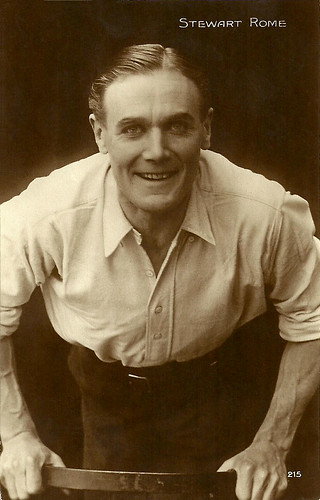
French postcard by Cinémagazine, no. 215.
Stewart Rome was born in Newbury, England in 1886. His birthname was Wernham Ryott Gifford according to Wikipedia, while Sandra Brennan at AllMovie and the IMDb list him as Septimus Wernham Ryott. Wernham Ryott was the name under which he wrote the script of The Man From India (1914).
Ryott studied to be a civil engineer, but instead went on the stage. After performing in Australia, he returned to the UK in 1912 and joined the Hepworth company in 1913. Hepworth renamed him Stewart Rome, and when he left Hepworth, after WW1 service, to join Broadwest he was forced to sue to keep the name.
At Hepworth, Rome played in dramas, crime films and comedies that were often directed by Frank Wilson, but also by Warwick Buckland or by producer Cecil Hepworth himself. From 1914 on, Rome often starred opposite Alma Taylor, Chrissie White and Violet Hopson, three female Hepworth regulars by then, while Lionelle Howard was often his male co-actor. Rome mostly had the male lead himself.
In the year 1914 Rome was already highly active, playing in some 30 short and medium-length films, such as the Charles Dickens adaptation The Chimes (Thomas Bentley, 1914), with Hopson and Warwick Buckland co-acting. In 1915 he repeated this amazing productivity with some 28 films. In addition to many short films, Rome also did several features like The Baby on the Barge (Cecil Hepworth, 1915), The Incorruptible Crown (Frank Wilson, 1915), Sweet Lavender (Cecil Hepworth, 1915), As the Sun Went Down (Frank Wilson, 1915), Barnaby Rudge (Thomas Bentley, Cecil Hepworth, 1915), and The Bottle (Cecil Hepworth, 1915).
He wrote the scripts for the films The Shepherd of Souls (Frank Wilson, 1915) and Coward! (Frank Wilson, 1915) in which he also impersonated a role. As Rome did less and less shorts, the number of his films decreased in the following years, but still he managed to play in 12 films in 1916. Among these films are Trelawny of the Wells (1916), Iris (1916), Annie Laurie (1916), and Coming Thro’ the Rye (1916), all directed by Cecil Hepworth and costarring Alma Taylor.
In 1917 Rome’s performances slowed down to 6 films. He made The Cobweb (Cecil Hepworth, 1917) and The American Heiress (Cecil Hepworth, 1917) with Alma Taylor, but he also appeared in films with Chrissie White as the female lead, such as The Eternal Triangle (Frank Wilson, 1917). In 1918 Stewart Rome only did only two films for Hepworth, probably because of the law case between Hepworth and Rome.
In 1919 he started to play with Violet Hopson in a string of dramas for his new studio. The first was probably the sports drama The Gentleman Rider (Walter West, 1919), which was followed by Snow in the Desert, A Great Coup, A Daughter of Eve, The Romance of a Movie Star, The Case of Lady Camber, Her Son, The Imperfect Lover, and When Greek Meets Greek. These films were almost all directed by Walter West for the company Broadwest and later for Walter West Productions, and almost all co-starring Violet Hopson. Incidentally Rome worked with other directors, such as Einar Bruun, or other co-leads such as Fabienne Fabrèges.
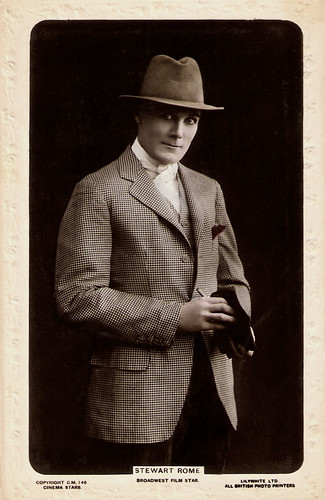
British postcard in the Lilywhite Photographic Series, no. C.M. 146. Photo: Broadwest.
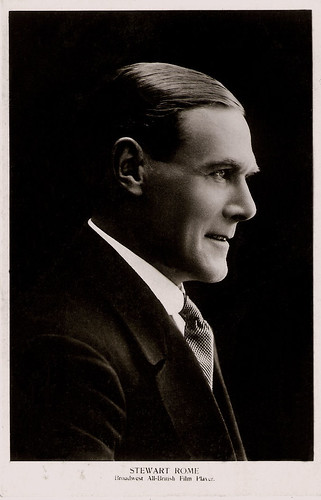
British postcard. Photo: Broadwest.
In the Encyclopedia of British Film, Anthony Slide characterises Stewart Rome as 'A slightly aloof and aristocratic-looking leading man'. In 1923 Rome went to work more international. He played in The Prodigal Son (A.E. Coleby, 1923), which was shot in Iceland and was based on a novel by Hall Caine.
In the same year he played Desmarets in the French Honoré de Balzac adaptation Ferragus (Gaston Ravel, 1923), opposite René Navarre in the title role. And he performed in the British-German coproduction Im Schatten der Moschee/In the Shadow of the Mosque (Walter R. Hall, 1923), produced by John Hagenbeck-Film.
In 1924 he was reunited with West and Hopson in the sports drama The Stirrup Cup Sensation (Walter West, 1924), he played opposite Mary Odette in Nets of Destiny (Arthur Rooke, 1924), opposite Betty Balfour in Réveille (George Pearson, 1924), and opposite Fay Compton and Lillian Hall-Davis in The Eleventh Commandment (George A. Cooper, 1924). Anthony Slide writes in the Encyclopedia of British Film: "He is memorable as the shell-shocked veteran in George Pearson's Reveille (1924), but is obviously too old to remain an acceptable leading man."
In 1925-1927 Rome went international again, playing detective William Voss in the Anglo-German co-production Vater Voss/Father Voss (Max Mack, 1925). After one film in Britain with Marjorie Hume: Thou Fool (Fred Paul, 1926), Rome tried his luck in Hollywood, playing in one American film: The Silver Treasure (Rowland V. Lee, 1926) starring George O’Brien.
Rome didn’t stay long in Hollywood. In 1927 he was back in Europe, in Berlin, to perform in three Elga Brink vehicles Die Frau ohne Nahmen/The Nameless Woman (1927), Liebe im Rausch/Intoxicated Love (1927), and Die Jagd nach der Braut/Bride Chase (1926), all directed by Georg Jacoby.
In the late 1920s Rome continued to play the male leads in several British films, in particular thrillers based on Edgar Wallace such as The Man Who Changed His Name (A.V. Bramble, 1928) or on Agatha Christie such as The Passing of Mr. Quin (Julius Hagen, Leslie S. Hiscott, 1928).
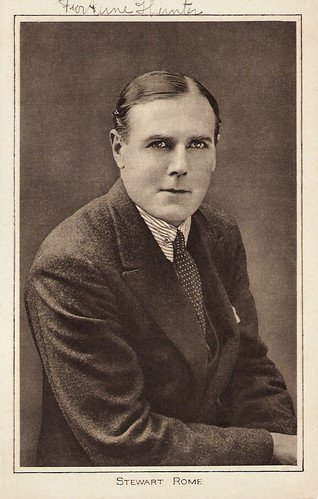
British postcard in the Pictures' Portrait Gallery by Pictures Ltd., London, no. 59. Photo: Broadwest Films Ltd.
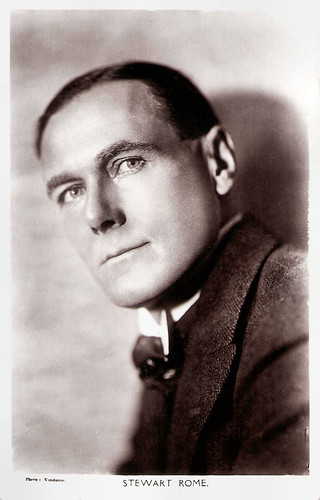
British postcard in the Picturegoer Series, London, no. 53. Photo: Vandamm.
Stewart Rome smoothly made the passage from silent to sound. Already in 1929 he played the lead in Dark Red Roses (Sinclair Hill, 1929), made for British Sound Film productions.
In the same year he played in the German production Der rote Kreis/The Red Circle (1929), which director Friedrich Zelnik first released as a silent film, but later had sound dubbed in using the British De Forest Phonofilm sound-on-film system – the Germans weren’t that far yet with sound cinema. It starred Zelnik’s wife and star Lya Mara, but also other renowned German and Austrian actors like Fred Louis Lerch, Hans Albers and Otto Wallburg. The film was again based on an Edgar Wallace story.
Rome also played in an Austrian-German film: Hingabe/The Woman at the Cross (Guido Brignone, 1929), which was still shot and released as a silent film. It starred Marcella Albani.
Until the late 1930s Stewart Rome continued to play in some 20 to 25 films, as a kindly character actor. These films ranged from crime films like Deadlock (Maurice Elvey, 1931) and Rynox (Michael Powell, 1932) to light musical comedies like Temptation (Max Neufeld, 1934), and from sports dramas like Kissing Cup's Race (Castleton Knight, 1930) to war dramas like Lest We Forget (John Baxter, 1934). Instead of Alma Taylor and Violet Hopson, his leading ladies were now Madeleine Carroll and Frances Day.
Towards the war years, Rome’s roles became smaller. He continued to play small parts in British cinema until 1950. In 1942, Rome began appearing for Rank as Dr Goodfellow in a series of inspirational shorts, 'A Sunday Thought for the Coming Week', roundly jeered at by audiences. His final role was a supporting part in the crime comedy Let's Have a Murder (John E. Blakeley, 1950).
In 1965 Stewart Rome died in his birthplace Newbury in England, at age 79. He was married to Grace Miller.
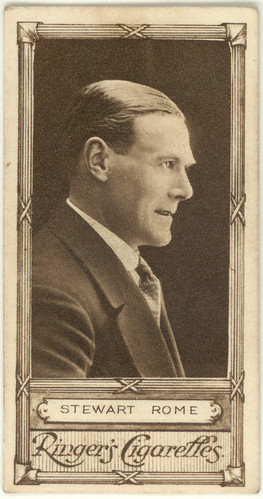
British cigarette card by Ringer's Cigarettes. Collection: Rescued by Rover (Flickr).
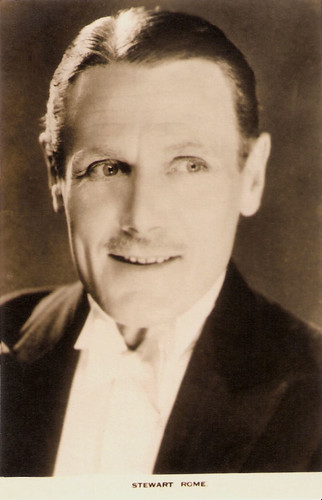
British postcard.
Sources: Anthony Slide (Encyclopedia of British Film), Thomas Staedeli (Cyranos), Sandra Brennan (AllMovie), BFI, Wikipedia, and IMDb.

French postcard by Cinémagazine, no. 215.
Hepworth
Stewart Rome was born in Newbury, England in 1886. His birthname was Wernham Ryott Gifford according to Wikipedia, while Sandra Brennan at AllMovie and the IMDb list him as Septimus Wernham Ryott. Wernham Ryott was the name under which he wrote the script of The Man From India (1914).
Ryott studied to be a civil engineer, but instead went on the stage. After performing in Australia, he returned to the UK in 1912 and joined the Hepworth company in 1913. Hepworth renamed him Stewart Rome, and when he left Hepworth, after WW1 service, to join Broadwest he was forced to sue to keep the name.
At Hepworth, Rome played in dramas, crime films and comedies that were often directed by Frank Wilson, but also by Warwick Buckland or by producer Cecil Hepworth himself. From 1914 on, Rome often starred opposite Alma Taylor, Chrissie White and Violet Hopson, three female Hepworth regulars by then, while Lionelle Howard was often his male co-actor. Rome mostly had the male lead himself.
In the year 1914 Rome was already highly active, playing in some 30 short and medium-length films, such as the Charles Dickens adaptation The Chimes (Thomas Bentley, 1914), with Hopson and Warwick Buckland co-acting. In 1915 he repeated this amazing productivity with some 28 films. In addition to many short films, Rome also did several features like The Baby on the Barge (Cecil Hepworth, 1915), The Incorruptible Crown (Frank Wilson, 1915), Sweet Lavender (Cecil Hepworth, 1915), As the Sun Went Down (Frank Wilson, 1915), Barnaby Rudge (Thomas Bentley, Cecil Hepworth, 1915), and The Bottle (Cecil Hepworth, 1915).
He wrote the scripts for the films The Shepherd of Souls (Frank Wilson, 1915) and Coward! (Frank Wilson, 1915) in which he also impersonated a role. As Rome did less and less shorts, the number of his films decreased in the following years, but still he managed to play in 12 films in 1916. Among these films are Trelawny of the Wells (1916), Iris (1916), Annie Laurie (1916), and Coming Thro’ the Rye (1916), all directed by Cecil Hepworth and costarring Alma Taylor.
In 1917 Rome’s performances slowed down to 6 films. He made The Cobweb (Cecil Hepworth, 1917) and The American Heiress (Cecil Hepworth, 1917) with Alma Taylor, but he also appeared in films with Chrissie White as the female lead, such as The Eternal Triangle (Frank Wilson, 1917). In 1918 Stewart Rome only did only two films for Hepworth, probably because of the law case between Hepworth and Rome.
In 1919 he started to play with Violet Hopson in a string of dramas for his new studio. The first was probably the sports drama The Gentleman Rider (Walter West, 1919), which was followed by Snow in the Desert, A Great Coup, A Daughter of Eve, The Romance of a Movie Star, The Case of Lady Camber, Her Son, The Imperfect Lover, and When Greek Meets Greek. These films were almost all directed by Walter West for the company Broadwest and later for Walter West Productions, and almost all co-starring Violet Hopson. Incidentally Rome worked with other directors, such as Einar Bruun, or other co-leads such as Fabienne Fabrèges.

British postcard in the Lilywhite Photographic Series, no. C.M. 146. Photo: Broadwest.

British postcard. Photo: Broadwest.
Detective William Voss
In the Encyclopedia of British Film, Anthony Slide characterises Stewart Rome as 'A slightly aloof and aristocratic-looking leading man'. In 1923 Rome went to work more international. He played in The Prodigal Son (A.E. Coleby, 1923), which was shot in Iceland and was based on a novel by Hall Caine.
In the same year he played Desmarets in the French Honoré de Balzac adaptation Ferragus (Gaston Ravel, 1923), opposite René Navarre in the title role. And he performed in the British-German coproduction Im Schatten der Moschee/In the Shadow of the Mosque (Walter R. Hall, 1923), produced by John Hagenbeck-Film.
In 1924 he was reunited with West and Hopson in the sports drama The Stirrup Cup Sensation (Walter West, 1924), he played opposite Mary Odette in Nets of Destiny (Arthur Rooke, 1924), opposite Betty Balfour in Réveille (George Pearson, 1924), and opposite Fay Compton and Lillian Hall-Davis in The Eleventh Commandment (George A. Cooper, 1924). Anthony Slide writes in the Encyclopedia of British Film: "He is memorable as the shell-shocked veteran in George Pearson's Reveille (1924), but is obviously too old to remain an acceptable leading man."
In 1925-1927 Rome went international again, playing detective William Voss in the Anglo-German co-production Vater Voss/Father Voss (Max Mack, 1925). After one film in Britain with Marjorie Hume: Thou Fool (Fred Paul, 1926), Rome tried his luck in Hollywood, playing in one American film: The Silver Treasure (Rowland V. Lee, 1926) starring George O’Brien.
Rome didn’t stay long in Hollywood. In 1927 he was back in Europe, in Berlin, to perform in three Elga Brink vehicles Die Frau ohne Nahmen/The Nameless Woman (1927), Liebe im Rausch/Intoxicated Love (1927), and Die Jagd nach der Braut/Bride Chase (1926), all directed by Georg Jacoby.
In the late 1920s Rome continued to play the male leads in several British films, in particular thrillers based on Edgar Wallace such as The Man Who Changed His Name (A.V. Bramble, 1928) or on Agatha Christie such as The Passing of Mr. Quin (Julius Hagen, Leslie S. Hiscott, 1928).

British postcard in the Pictures' Portrait Gallery by Pictures Ltd., London, no. 59. Photo: Broadwest Films Ltd.

British postcard in the Picturegoer Series, London, no. 53. Photo: Vandamm.
Dr. Goodfellow
Stewart Rome smoothly made the passage from silent to sound. Already in 1929 he played the lead in Dark Red Roses (Sinclair Hill, 1929), made for British Sound Film productions.
In the same year he played in the German production Der rote Kreis/The Red Circle (1929), which director Friedrich Zelnik first released as a silent film, but later had sound dubbed in using the British De Forest Phonofilm sound-on-film system – the Germans weren’t that far yet with sound cinema. It starred Zelnik’s wife and star Lya Mara, but also other renowned German and Austrian actors like Fred Louis Lerch, Hans Albers and Otto Wallburg. The film was again based on an Edgar Wallace story.
Rome also played in an Austrian-German film: Hingabe/The Woman at the Cross (Guido Brignone, 1929), which was still shot and released as a silent film. It starred Marcella Albani.
Until the late 1930s Stewart Rome continued to play in some 20 to 25 films, as a kindly character actor. These films ranged from crime films like Deadlock (Maurice Elvey, 1931) and Rynox (Michael Powell, 1932) to light musical comedies like Temptation (Max Neufeld, 1934), and from sports dramas like Kissing Cup's Race (Castleton Knight, 1930) to war dramas like Lest We Forget (John Baxter, 1934). Instead of Alma Taylor and Violet Hopson, his leading ladies were now Madeleine Carroll and Frances Day.
Towards the war years, Rome’s roles became smaller. He continued to play small parts in British cinema until 1950. In 1942, Rome began appearing for Rank as Dr Goodfellow in a series of inspirational shorts, 'A Sunday Thought for the Coming Week', roundly jeered at by audiences. His final role was a supporting part in the crime comedy Let's Have a Murder (John E. Blakeley, 1950).
In 1965 Stewart Rome died in his birthplace Newbury in England, at age 79. He was married to Grace Miller.

British cigarette card by Ringer's Cigarettes. Collection: Rescued by Rover (Flickr).

British postcard.
Sources: Anthony Slide (Encyclopedia of British Film), Thomas Staedeli (Cyranos), Sandra Brennan (AllMovie), BFI, Wikipedia, and IMDb.
No comments:
Post a Comment